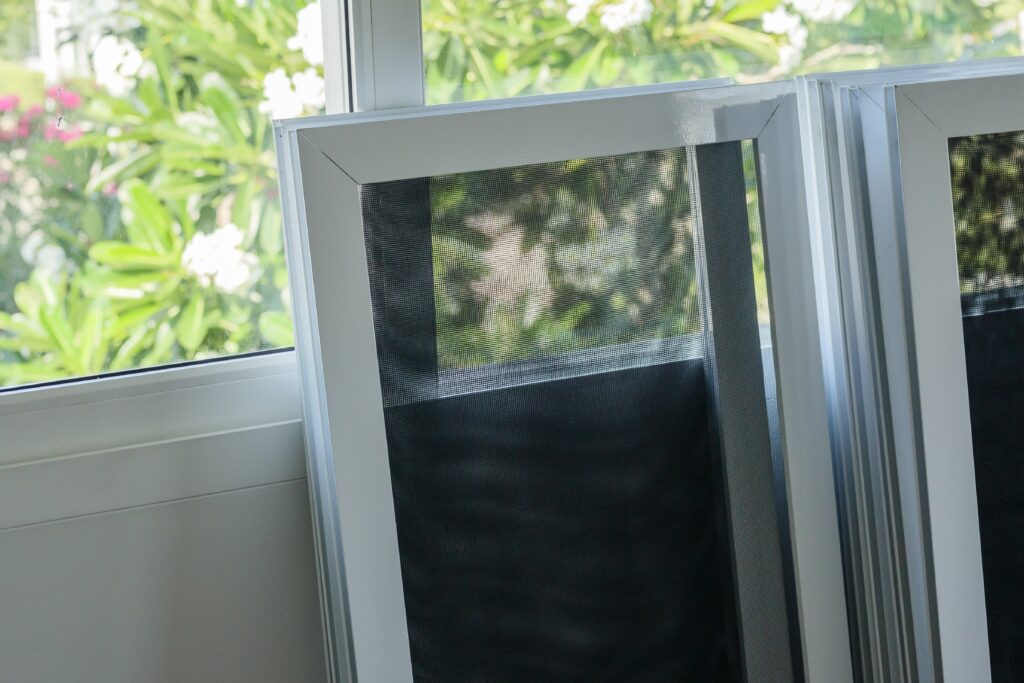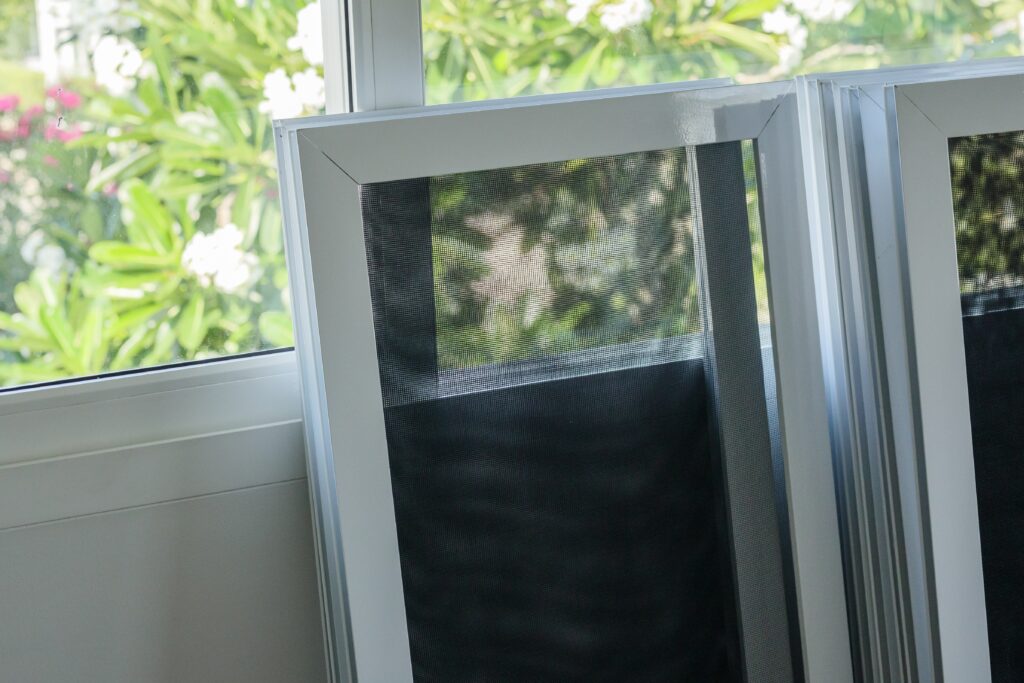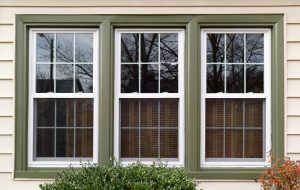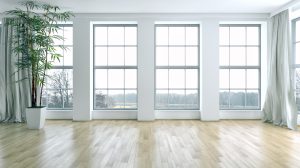
Window screens may seem like a simple addition to a home, but they offer a wealth of benefits that go beyond just keeping out bugs. From improving ventilation and energy efficiency to adding an extra layer of security and enhancing curb appeal, window screens play an essential role in home comfort and protection.
This article explores the various advantages of window screens, with insights on how they contribute to a healthier, safer, and more energy-efficient home.
Table of Contents
Improved Ventilation
Ventilation is essential for a healthy and comfortable home environment. Poor ventilation can lead to moisture buildup, mold growth, and stagnant air, which can affect both your health and your home’s structural integrity. With window screens, you can open windows freely, allowing fresh air to circulate without the worry of bugs or outdoor debris entering your home.
Health Benefits of Fresh Air Indoors
Fresh air improves indoor air quality by reducing airborne contaminants and enhancing respiratory health. With screens, you can safely open windows to allow natural air exchange, reducing allergens and indoor pollutants. The benefits of fresh air extend beyond physical health, as it’s also been shown to:
- Improve mood and mental clarity.
- Increase productivity.
- Reduce indoor moisture buildup, helping prevent mold and mildew growth.
Comparison of Natural vs. Mechanical Ventilation
While mechanical ventilation systems like fans and air conditioning are common, natural ventilation through screens offers an eco-friendly alternative that requires no energy. Unlike mechanical systems, which often recirculate indoor air, window screens allow you to bring in fresh outdoor air, reducing energy costs and improving air quality. This natural approach to ventilation is particularly useful in mild weather, helping to reduce your reliance on powered systems.
Pest Control and Insect Protection
Insects and pests can be a constant nuisance, especially during certain seasons. Flies, mosquitoes, and other bugs can easily enter through open windows, bringing along the potential for bites, allergies, and even disease. Window screens provide a robust barrier against these unwanted guests, allowing you to enjoy fresh air without the risk of intrusion.
Seasonal Pest Management
Window screens are invaluable during peak insect seasons, particularly in summer. With screens in place, you can enjoy cool evening breezes without worrying about mosquitoes, flies, or other insects entering. Seasonal pest control through screens also provides:
- Protection against disease-carrying insects, like mosquitoes.
- Cleaner living spaces by keeping out flies and other pests.
- A more comfortable environment for pets that may interact with open windows.
Allergy Relief through Screens
Certain screens are designed with a finer mesh to filter out pollen and other allergens, allowing individuals with seasonal allergies to enjoy fresh air without exposure to outdoor allergens. These “allergy screens” are especially beneficial during high pollen seasons, as they create a healthier indoor environment while still enabling airflow.
Enhanced Home Security
Home security is a major priority, and window screens can play a role in providing an added layer of protection. High-quality screens, especially security screens, are crafted from durable materials like stainless steel mesh that resist tampering and break-ins. Security screens are particularly beneficial for homes with ground-level windows or properties in urban areas where extra security measures may be warranted.
Types of Security Screens
Several types of security screens cater to different safety needs:
- Reinforced Mesh Screens: Designed for durability, offering strong resistance to tampering.
- Screens with Metal Grilles: Provide enhanced protection with an added layer of metal for homes in high-risk areas.
- Lockable Security Screens: These screens come with locking mechanisms, offering additional protection at entry points.
Emergency Escape Features
Many security screens are equipped with emergency release mechanisms that allow quick escape in case of fire or other emergencies. These screens provide secure barriers but allow easy escape when necessary. For safety, select security screens with accessible release features, especially for bedrooms and other frequently used rooms.
UV Protection for Interior Spaces
The sun’s UV rays can cause damage to your home’s interior over time. Prolonged exposure to UV radiation can lead to the fading of furniture, carpets, and flooring, diminishing the longevity of these investments. Window screens with UV-blocking properties can help protect these interior elements by filtering out a significant portion of harmful UV rays.
Types of UV-Blocking Screens
UV-blocking screens are available in several materials and opacities. Common options include:
- Metal-Coated Screens: These screens reflect UV rays, providing extra protection.
- Dark Mesh Screens: Made from tinted or dark materials to block a high percentage of UV rays.
- Specialty Treated Screens: Designed to filter UV light without sacrificing natural light indoors.
Comparison of Window Film vs. UV Screens
Window screens offer UV protection while allowing ventilation, making them a more versatile option than UV-blocking window film. Unlike films, screens are easily removable, allowing seasonal flexibility. UV screens can block harmful rays and reduce sunlight intensity, providing a balance of light control and airflow for homeowners.
Improved Energy Efficiency
Energy efficiency is a concern for many homeowners, especially during peak summer months when cooling costs can surge. Window screens play an often-overlooked role in improving a home’s energy efficiency by reducing the amount of direct sunlight entering the space. This shading effect helps lower indoor temperatures, reducing the need for air conditioning and ultimately leading to cost savings.
Regional Benefits of Screens for Energy Savings
The energy-saving potential of window screens varies by region. In warm, sunny climates, screens that block sunlight can help keep homes cooler, decreasing cooling costs. In temperate regions, they allow for natural ventilation during mild seasons, reducing dependency on air conditioning and lowering energy use.
Energy-Efficient Screen Types
Some screens are specifically designed for maximum energy efficiency, such as:
- Reflective Screens: Contain metallic coatings that bounce sunlight away.
- Insulating Screens: Made from thicker synthetic fibers that resist heat transfer, providing temperature regulation year-round.
Added Privacy
Privacy is a common concern, particularly for homes located near busy streets or close to neighbors. Privacy screens offer an excellent solution by restricting visibility from the outside while maintaining clear views from within. This unique feature allows you to enjoy natural light and outdoor views without sacrificing privacy.
Best Locations for Privacy Screens
Privacy screens are ideal for windows in bathrooms, bedrooms, or any area where additional seclusion is preferred. For homes in busy neighborhoods or urban settings, privacy screens offer peace of mind by reducing visibility without blocking light.
Comparing Privacy Levels in Different Screen Types
Privacy screens come in various types, including:
- One-Way Screens: Allow clear views from the inside while blocking views from outside.
- Tinted or Dark Screens: Provide enhanced privacy with increased opacity.
- High-Weave Screens: Offer subtle privacy without compromising light transmission.
Reduced Glare Indoors
Direct sunlight can create uncomfortable glare, especially on electronic screens, which can be disruptive during activities like watching TV, reading, or working. Window screens help filter sunlight, reducing glare without blocking out natural light entirely. This feature allows you to enjoy well-lit spaces without the drawbacks of excessive brightness.
Impact on Eye Comfort and Health
Reducing glare through screens minimizes eye strain, particularly for those who work from home or spend extended periods on digital devices. The filtered light helps create a balanced indoor environment, reducing visual fatigue and making spaces more comfortable for both work and relaxation.
Glare Reduction for Indoor Plants
Filtered sunlight through screens is beneficial for indoor plants, providing a softer light source that reduces the risk of leaf burn. Screens offer the right balance of natural light for healthy plant growth without the risk of sun damage.
Customizable Screen Options
While functionality is key, window screens can also add to your home’s curb appeal. Screens are available in a range of colors, styles, and frame designs, allowing you to choose options that complement your home’s exterior and interior design. This versatility ensures that screens not only serve practical purposes but also contribute to the overall look of your property.
Material Options for Different Needs
Each screen material offers unique benefits:
- Fiberglass: Lightweight and corrosion-resistant, making it ideal for most climates.
- Aluminum: Durable but may corrode in coastal regions.
- Polyester: Flexible and scratch-resistant, especially useful for homes with pets.
Motorized and Smart Screen Options
Advanced screens include motorized and smart features that allow you to adjust them with a remote or app. Motorized screens retract fully when not needed, offering unobstructed views. Smart screens automatically close during peak sunlight hours, adding convenience and functionality for homeowners.
Easy Maintenance and Durability
Modern window screens are designed for durability and ease of maintenance. Made from materials like fiberglass, stainless steel, or aluminum, today’s screens are resistant to corrosion, weathering, and general wear and tear. High-quality materials make screens suitable for various climates, from humid regions to arid areas, without compromising longevity.
Weather Resistance and Longevity
Weather-resistant screens, such as those made of stainless steel or UV-protected synthetic fibers, are ideal for regions with extreme weather. These screens withstand corrosion and UV damage, ensuring long-term durability. By selecting screens designed for your climate, you can maximize their lifespan and performance.
Quick Fixes and Repairs
Minor screen damage, such as small holes or loosened frames, can often be repaired with patch kits or by reattaching the screen material. Larger issues may require professional repair, but regular maintenance and timely fixes help prevent extensive damage and extend screen life.
Seasonal Flexibility
One of the practical aspects of window screens is their seasonal flexibility. Removable screens make it easy to adjust your home’s setup based on weather and seasonal preferences. During the winter months, for example, removing screens allows more sunlight to warm indoor spaces, potentially reducing heating costs.
Weather-Specific Screen Options
Certain screens are designed for seasonal needs:
- Insulating Screens: Provide extra thermal protection in colder months.
- Ventilating Screens: Made with larger weaves for increased airflow in warmer weather.
Storage Tips for Removable Screens
Proper storage of removable screens helps maintain their condition. Clean screens thoroughly before storing, dry them to prevent mold or mildew, and store them in a dry, protected space. Stack them flat or stand them upright, covering them to keep dust-free and ready for seasonal use.
Conclusion
Window screens may seem like a minor detail, but their benefits reach far beyond pest control. From enhancing ventilation and indoor air quality to improving energy efficiency and privacy, screens are an affordable and adaptable addition that can significantly enhance your home’s comfort and functionality. By blocking harmful UV rays, reducing glare, and even boosting home security, window screens protect both your health and property investments.
Whether you’re interested in energy savings, improved ventilation, or simply want to enjoy fresh air without pests, the right window screens offer a wide range of benefits tailored to meet your unique needs. Investing in quality screens means creating a safer, more comfortable home environment—season after season. Get in touch with a local window pro today!
FAQs
Should you remove your window screens when selling a house?
Removing screens for showings can brighten rooms, but keeping screens available allows potential buyers to see their benefits. Many buyers appreciate the added functionality screens provide.
Do window screens deteriorate?
Over time, screens can deteriorate from exposure to weather, especially if frequently exposed to rain and UV rays. With regular cleaning and timely repairs, high-quality screens can last up to 15 years.
Should window screens be removed in winter?
In colder climates, removing screens during winter maximizes sunlight and reduces moisture buildup. However, screens can remain year-round in mild climates for added security and pest control.
Sources
- Metro Screenworks
- Oknoplast
- Angi
- Screenmobile
Additional Window Resources
- 10 Benefits of Window Replacement
- How to Insulate Your Windows for Energy Efficiency and Comfort
- Choosing the Right Type of Replacement Windows

Anna has over six years of experience in the home services and journalism industries and serves as the Content Manager at MyHomePros.com, specializing in making complex home improvement topics like HVAC, roofing, and plumbing accessible to all. With a bachelor’s degree in journalism from Auburn University, she excels in crafting localized, comprehensive guides that cater to homeowners’ unique needs. Living on both coasts of the United States has equipped her with a distinctive perspective, fueling her passion for turning any house into a cherished home through informed, personalized decision-making.
Connect with top-rated local contractors who can help you with siding, roofing, HVAC, windows, and more. Get free quotes from verified professionals in your area today.







